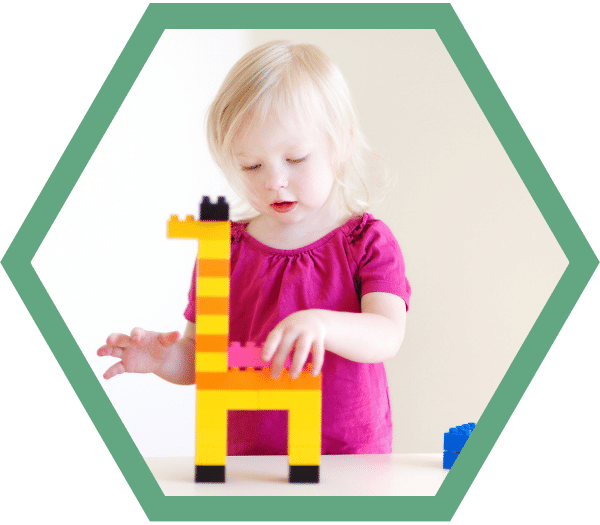
Toy and play information
Children aged
12 to 24 months
At this age your baby is learning through imaginary and explorative play.

Play ideas
Pretend play
How does it help the baby?
Helping my child learn through imitating
Tips:
- Encouraging the use of toys and objects that imitate adult activities, such as saucepans, hoovers and brushes.
- Inviting your child to ‘help’ with household task
- Imitating your child’s actions, and then continuing play by adding additional steps (feeding dolls, pretend drinking)
- Playing dressing-up games with things such as hats and shoes
- Adding descriptive words, such as “you’re giving the teddy dinner! Teddy is hungry” and “you are so kind”
Scroll down to read more.
Shape sorter mega blocks insert puzzles
How does it help the baby?
Helping my child learn through exploring
Tips:
- Facilitating object manipulation, turning them around
- Encouraging problem solving and concentration
- Helping coordinate hands and eyes
- Stimulating visual perception, such as copying a structure such a train or a bridge
- Playing to identify and match pictures
Note: To make it easier, model how to do it.
Scroll down to read more.
Crayons
How does it help the baby?
Helping my child learn through mastering their hands
Tips:
- Painting or making marks with crayons
- It helps develop strength and finger control
- It is the beginning of hand preference
Scroll down to read more.
Books
How does it help the baby?
Boosting my child’s language
Tips:
- Pointing and naming pictures in books
- Talking about the story together while reading
- Encouraging imitating actions from the story, such as jump like the frog in the book or bark like the do
- Encouraging holding the book and turning pages
Note: Young children have likes and dislikes. Let them decide which books to read.
Scroll down to read more.
Football, push and pull toys, and climbing
How does it help the baby?
Helping my child develop physical skills
Tips:
- Using a walker that is weighted on the front to promote and practice walking
- Playing football to develop balance, coordination and kicking
- Providing cushions or small and safe steps to climb under your supervision to develop strength and coordination
Scroll down to read more.
Did you know?
Young children of this age will imitate much of the world around them. They learn through their experiences in their environment; for example, feeding themselves. Reading stories and naming objects is a great way to develop their language skills.
Tips and ideas
Building skills
Learning to play cooperatively – Promote spending time with other children. Let your child explore on their, own but keep close supervision.
Encourage everyday skills – Encourage your child to use a spoon and drink from a cup to promote independent self-feeding. Let your child help with getting dressed and undressed.
Language: chat with your child – Parents who talk more to their children help them develop larger vocabularies and more advanced sentence structures.
Things to remember
Imaginary play – Let your child play with blocks, play kitchens, boxes, dolls, teddys, cars and trains. Encourage playing house, doctor or a make-believe tea party.
Pretend play – When playing with your child, imitate their actions and then add interesting ‘twists’ such as inviting child to perform a new activity with the objects, for example, use a napkin as a blanket.
Social and economic growth – Your child is learning to be more independent and “No” becomes their favourite word.
Keep your baby safe
Be there for your child – Be nearby while they play and explores. Give your child the confidence to try new things and build independence.
Home safety – Keep household chemicals and medicines out of reach. Lock away all dangerous items. Supervision is essential at this age.
Continue to avoid screen time – Some studies show that children who watch TV or have too much screen time can have poorer concentration and poorer language development.
Did you know?
Children of this age have a lot of energy and can be fearless so they need close supervision. They need to learn about safety and have boundaries.
The advice on this page has been created by B. Hutchon and S. Powell, Royal Free London, together with Dr. A. Fernandez, Neonatologist San Jose Hospital, Chile.

